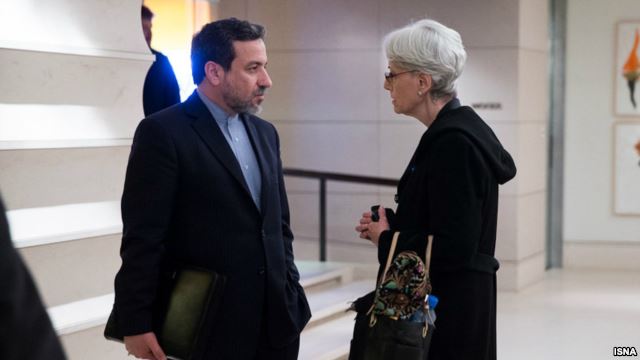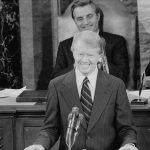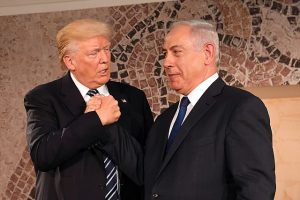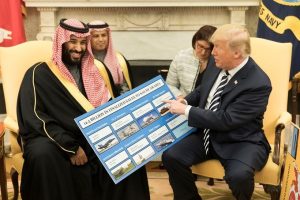by Robert E. Hunter
With bilateral US-Iran talks taking place in Geneva today, notably topped for the US by Deputy Secretary of State Bill Burns, who led earlier secret exchanges, negotiations between Iran and world powers might be entering their final phase — or not.
Such is the nature of difficult negotiations, involving countries that, in the case of the United States and Iran, have a 35-year history of bad relations. Such is also the nature of negotiations where the stakes are so high.
Should the negotiations fail, at the extreme Iran might move toward developing nuclear weapons, though it stoutly denies this intention. To keep it from doing so, the US has pledged that the military option “remains on the table,” though it devoutly prefers not to use it or to have its hand forced by Israel.
The qualifier “or not” is necessary because the actual negotiations have been conducted more privately than one would have expected; because the notional deadline of July 20 isn’t a true deadline at all; and because, as happens with such hotly contested and highly complex issues as are involved here, there can be “many a slip ‘twixt cup and lip” even when everyone is acting with the best of intentions.
Counters to skepticism that this round of talks will produce a final agreement include the fact that just about every issue that could be raised has been talked virtually to death. A host of experts has been engaged. The finer points of all issues have long been on the table and have been masticated by all sides “from here to Sunday.”
Indeed, if there are any points where the interests of the parties are not crystal clear, it is not from lack of trying. That doesn’t mean that the different parties — perhaps all of them — have not held back that one last point in hopes of getting a slightly better deal at the 11th hour, in particular to be able to argue to critics back home, of which there is a plethora, that, in the end “we showed them [fill in the blank] that we are tough bargainers.”
Shades of the Cold War
This is not the first time that negotiations of this importance have come down to the wire in this fashion. During the Cold War, this was typically part of every set of US-Soviet arms control talks, which were just as abstruse, just as contentious to the last niggling detail, and just as freighted with the political need for each side to argue that it had obtained the best deal that was humanly possible.
The parallel is apt. In both cases, long before the negotiating end-game, the people sitting at the table across from one another have understood the terms, both great and small, of the deal that will best suit all claimants and can produce a diplomatic solution. But in both cases, US-Soviet arms control negotiations and talks on the Iranian nuclear program, the devil is very much not “in the details,” but in the politics, and not even in the last little compromises that each side needs in order to counter the critics back home.
The politics are about the nature of the basic relationships between the contending parties. In US-Soviet relations, the need was for both sides to be able to claim that they were equals, that the nuclear symbols of relative power were finely balanced. Whether one side or the other had a few more missiles or warheads or “throw weight” had no strategic significance in the event of conflict: utter destruction to both sides was guaranteed. But the symbols of “equality” or, more prosaically, of “face,” were critical.
Of course, Iran cannot represent itself as the equal of any of its interlocutors, by any relevant measure, but both it and its negotiating partners need to emerge from the talks with a clear sense that they have preserved what is politically essential to them.
There is a second parallel between the Cold War and now. Arms control talks between the US and Soviet Union were only partly about weapons themselves and being able to represent to publics and other countries that “parity” — a stand-in for perceptions of power — was achieved. At least as important was the experience of both sides in getting to know and understand one another in terms of interests, expectations, ambitions, hopes, and fears. The fact that US-Soviet arms control negotiations took place was as important as the results produced, and they played a central role in developing détente and eventually making possible the end of the Cold War.
That positive political result may not result from the P5+1’s (US, UK, France, China, Russia + Germany) negotiations with Iran, but it should not be ruled out. Already, with new leadership in both the United States (President Barack Obama) and Iran (President Hassan Rouhani, generally supported by the Supreme Leader, Ali Khamenei) the possibilities for détente and perhaps an end to the US-Iran Cold War are being developed at the bargaining table. This is much to be hoped, given that, outside of contention over nuclear matters, there is a good deal that can move Iran and the West in similar directions, not least regarding Afghanistan’s future, possibly also Iraq’s, shared opposition to al-Qaeda and its ilk, and other interests like counter-piracy and freedom of navigation, especially through the Strait of Hormuz.
There is also a third parallel. In its arms control negotiations with the Soviet Union, US presidents faced intense domestic political opposition to reaching agreements with the enemy. In retrospect, no American in his right mind can still declare his opposition to the détente with the Soviet Union pursued by several presidents. At the time, however, critics abounded, leaders were excoriated, and nay-sayers in Congress did their best to undercut the efforts of the White House.
The domestic politics factor
It is far from clear that President Rouhani can surmount opposition in Iran to reaching a deal with the “Great Satan,” even though, at last count, he seems to have the support of the Supreme Leader. Meanwhile, many powerful Iranians, especially in the clerical establishment, fervently hope that the current talks will collapse. Indeed, they would welcome the West raising the stakes so high in the diplomatic end-game that Rouhani will fail.
That is also true in the United States, and this may ultimately result in the undoing of a potential agreement, whatever proves to be possible at the bargaining table.
President Obama is under intense pressure, especially from a significant part of Congress, to be unyielding on a range of matters — the details of which are less relevant than their use to cause him to flounder. Indeed, he has struggled to keep Congress from pressing for increased economic sanctions against Iran, at the very moment when US bona fides are being tested in regard to implementing last November’s Joint Plan of Action and to offering sanctions relief indispensable to a final agreement.
The interests of others
The key to this struggle over the president’s capacity to act in the US national interest is the fact that, unlike the case of US-Soviet arms control negotiations, he must also consider the perspectives of a range of countries in the Middle East, notably Israel and Saudi Arabia.
It’s not just that the US has to be certain that Iran cannot retain a capability at some point in the future to “break out” and move toward a bomb –which is also very much in the American interest. It is also that both Israel and most of the Gulf Arabs oppose, on any terms, potential reconciliation between Iran and the West and especially the United States. This element of their concern is not about security, per se, but about power, and especially Iran’s potential regional role, post-sanctions and post-isolation.
These states are concerned in particular by the prospect of normalized US-Iran relations. It is no surprise therefore, that several of America’s Middle East partners are, at best, ambivalent about signs of possible success in negotiations on Iran’s nuclear program. From their perspective, they would welcome the trammeling of Iran’s possible nuclear ambitions; but they oppose Iran’s remerging as a full-fledged competitor for power and influence in the region, potentially a collateral product of success in the negotiations.
The implications of such a development obviously need to be considered by the United States, as leader among Western states, both in the Middle East and beyond, as the possibility emerges of an end to the Iranian-Western Cold War.
As much as they would like the status quo to continue, some local states, notably some Gulf Arabs, are not sitting on their hands. They are already exploring the possibility of changed relations with Iran, as demonstrated by recent high-level exchanges of visits with Tehran. Egypt is also adjusting, symbolized by its invitation to Iran’s Ayatollah Khamenei for President Abdel Fattah al-Sisi’s inauguration this week (Iran is sending its deputy foreign minister). China and Russia are meanwhile ready to step up economic and other ties; and the private sector throughout the West is restlessly waiting at the starting gate.
In the final analysis, if President Obama and his Iranian counterparts can weather domestic opposition to an agreement — where Obama faces congressional opposition that is heavily influenced by Israel — we will witness the beginning of fundamental change in the Middle East. It is far from clear, however, that the US government has begun to think through the consequences of this and started to plan accordingly.
Photo: Iran’s Deputy Foreign Minister Abbas Araghchi and US Under Secretary of State for Political Affairs Wendy Sherman photographed here during last years negotiations in Geneva, will be among the top-level diplomats meeting for bilateral talks in the Swiss city today. June 9-10. Credit: ISNA






Sound analysis. And how very true, that direct talks between US officals and their Iranian counterparts has been a welcome element arising from the talks between P5+1 and Iran. US Congress has very foolishly tried to prevent direct talks between American officials and Iranian counterparts.
If congress is able to stop a settlement on behalf of Israeli demands, then congress needs to resign, let others who can see the bigger picture for world peace, not to satisfy the Israeli government egos, which in effect, calling the shots for the whole of the M.E.
Iranian nuclear “capability” is not and never was the issue. The entire “Iranian nuclear threat’ issue was always just a pretext for imposing regime-change in Iran, just as “WMDs in Iraq” was just a pretext. Currently 40 nations already are capable of “breaking out” and making nukes. Iran has joined 1 out of 4 nations on the planet. “Breakout capacity” is just another pretext for emnity and pressure on Iran, that’s all. The NPT does not prohibit breakout and instead positively encourages the development of nuclear technology “to the fullest extent possible and without discrimination.”
@Cyrus – – Iran can of course make a deal with P5+1 and nontions of “regime change” on the part of neocons et al will go up in smoke.
I think we’re seeing now why a deal with Iran will inevitably fail and that is because the one non-negotiable part for Iran will be its insistence on significantly upgrading and expanding its refining capacity with next generation centrifuges. Zarif and other ranking officials, including Khamenei have drawn a line in the sand at refining capacity because with it, they could afford to give away almost every other concession to the West while still retaining the ability to quickly generate a stockpile of weapons grade material. Iran views this capacity as its trump card against the perceived threat posed by Israel and its final billy club it can use against its neighbors since possessing the ability to quickly make bomb material is almost as good as the ability to build a bomb since Iran already possesses the technical know how to assemble and deliver a weapon thanks to North Korea technology transfers.
The West knows this which is why it has been insistent about cutting capacity, not expanding it and ultimately is what is causing Iran to issue muted calls for a six month extension in talks beyond the July deadline.